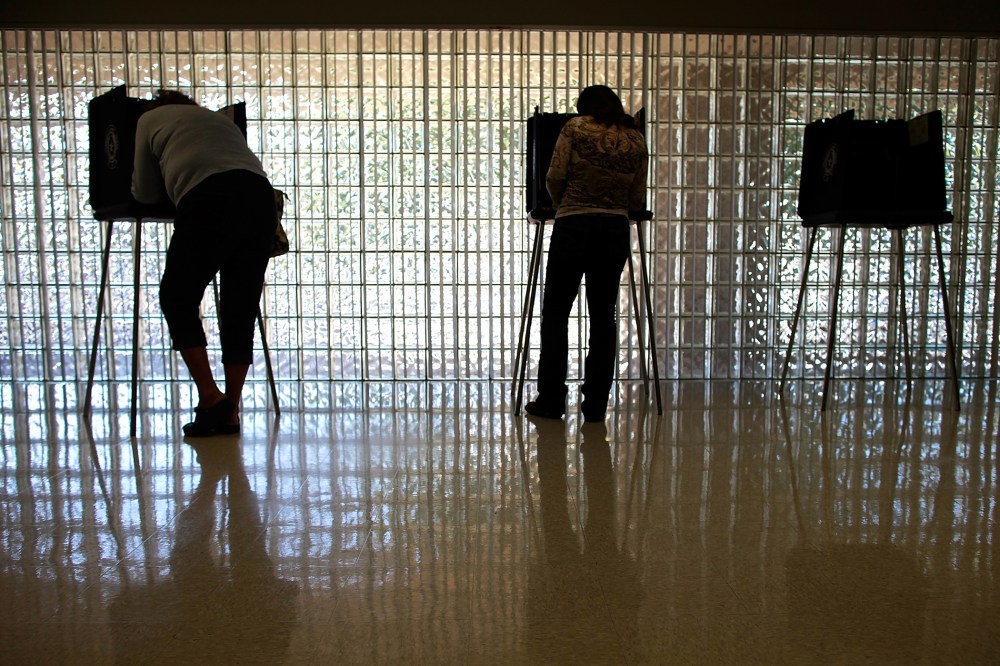Thousands of Texans are being disenfranchised thanks to chronic failures in the state’s voter registration system, a Democratic group alleges based on government records and extensive additional evidence.
The charges raise serious questions about Texas’s commitment to making the ballot box accessible to new voters, and about its compliance with federal voting law.
In a letter sent Wednesday to Texas Secretary of State Carlos Cascos, lawyers for Battleground Texas, which works to register voters in the state, wrote that the state government’s “voter registration failures are widespread and systematically undermining the right to vote in Texas.”
RELATED: SCOTUS to take up Texas voting dispute
The letter, which was obtained exclusively by msnbc, is likely to precede a lawsuit under the National Voter Registration Act (NVRA), more commonly known as the Motor Voter law, which requires states to offer registration opportunities through their motor vehicle departments and other government agencies.
“If the state does not want to engage and take the steps necessary to fix this, then we’re prepared to initiate legal action,” Peter Kraus, a lawyer representing Battleground Texas, said in a phone interview.
A spokesperson for the secretary of state’s office didn’t immediately respond to a request for comment.
The allegations offer the latest evidence that Texas’s Republican administration is creating obstacles to voting as the state’s soaring Hispanic population threatens to shift the balance of power in the state. Around 2 million Texas Hispanics are unregistered, and just 39% of eligible Hispanics in the state voted in 2012, compared to 61% of eligible whites and 63% of eligible blacks.
Battleground was launched in 2013 by former Obama campaign staffers with the goal of making Texas competitive for Democrats by registering new voters.
Voter registration snafus also disproportionately affect people who move frequently—the poor, minorities, and young people. All those groups tend to vote Democratic.
RELATED: Republicans reject another way to expand voting access
It’s impossible to quantify just how many Texans have been disenfranchised thanks to the registration breakdowns identified by Battleground Texas. State records obtained via an open records request submitted by the group show that over the last four months of 2013 and all of last year, counties received over 4,600 complaints from would-be voters about registration issues—some of which appear not even to have been investigated.
Probably not all of those voters were ultimately kept from the polls, since Texas says some have subsequently been registered, though it’s not clear whether that happened before or after they tried to vote. But the 4,600 number is itself likely the tip of the iceberg of those who have had problems. For one thing, the tally only included data from the fewer than half of the state’s counties that reported complaints to the state. For another, lodging a complaint with the county can be a multi-step process that takes a certain level of initiative. That strongly suggests the number captures only a small fraction of those who faced obstacles.
Whatever the actual figure, the data make clear that the number of eligible voters being kept from the polls thanks to registration problems is exponentially greater than the number of ineligible voters casting ballots in the state, a concern that led Texas to pass the country’s strictest voter ID law. Since 2000, there have been just two proven cases of in-person fraud that would have been prevented by an ID requirement.
In interviews with msnbc, would-be voters expressed frustration and anger as they recounted going through the required registration procedures, only to be denied when they went to vote.
Totysa Watkins said that soon after she moved within the city of Irving in 2013, she updated her driver’s license and voter registration address online. But when she went to vote last November—bringing her five-year-old daughter with her to show her the importance of voting—Watkins was told she wasn’t on the rolls and forced to cast a provisional ballot. Two weeks later, she got a letter from the county saying her ballot had been rejected because there was no record of her voter registration application on file.
“I have been voting since I was 21, and to receive a letter that says my vote didn’t count just upset me. I feel like my voice wasn’t heard,” Watkins, who is 39 and African-American, said in an interview. “Even now, talking about it, it brings tears to my eyes.”
De’Andre Carter told a similar story. He went into the Department of Public Safety (DPS) to change his driver’s license and voter registration soon after moving last summer from College Station, where he was a student, to Dallas County. Carter, a 24-year-old schoolteacher, wanted to vote in the 2014 elections. Soon afterwards, his new license arrived, but not his registration card. When he called DPS, he said, they told him they’d been having problems with the system.











